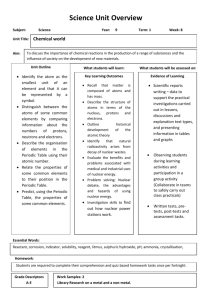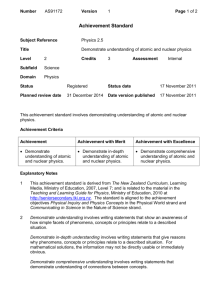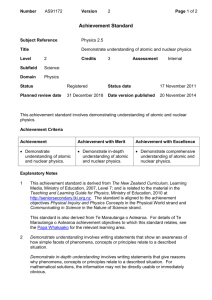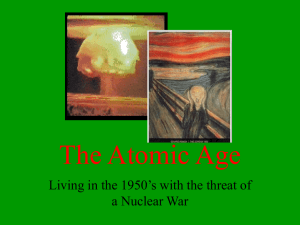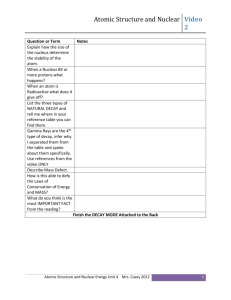GREAT BASIN COLLEGE INT 369, INTEGRATIVE SCIENCE
advertisement
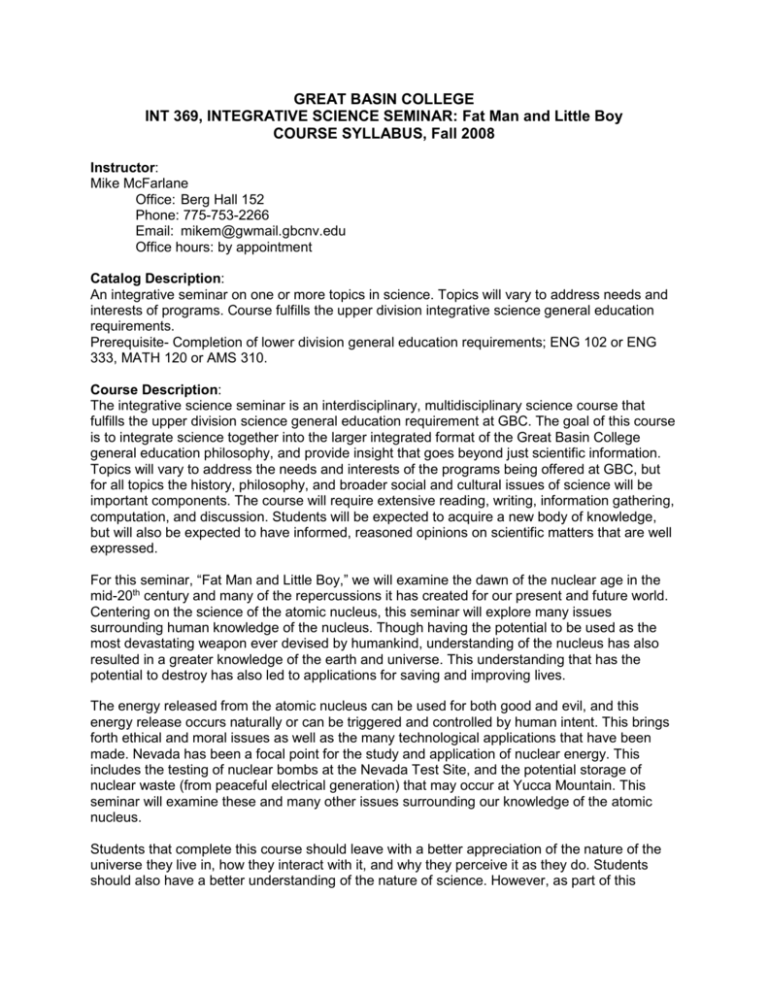
GREAT BASIN COLLEGE INT 369, INTEGRATIVE SCIENCE SEMINAR: Fat Man and Little Boy COURSE SYLLABUS, Fall 2008 Instructor: Mike McFarlane Office: Berg Hall 152 Phone: 775-753-2266 Email: mikem@gwmail.gbcnv.edu Office hours: by appointment Catalog Description: An integrative seminar on one or more topics in science. Topics will vary to address needs and interests of programs. Course fulfills the upper division integrative science general education requirements. Prerequisite- Completion of lower division general education requirements; ENG 102 or ENG 333, MATH 120 or AMS 310. Course Description: The integrative science seminar is an interdisciplinary, multidisciplinary science course that fulfills the upper division science general education requirement at GBC. The goal of this course is to integrate science together into the larger integrated format of the Great Basin College general education philosophy, and provide insight that goes beyond just scientific information. Topics will vary to address the needs and interests of the programs being offered at GBC, but for all topics the history, philosophy, and broader social and cultural issues of science will be important components. The course will require extensive reading, writing, information gathering, computation, and discussion. Students will be expected to acquire a new body of knowledge, but will also be expected to have informed, reasoned opinions on scientific matters that are well expressed. For this seminar, “Fat Man and Little Boy,” we will examine the dawn of the nuclear age in the mid-20th century and many of the repercussions it has created for our present and future world. Centering on the science of the atomic nucleus, this seminar will explore many issues surrounding human knowledge of the nucleus. Though having the potential to be used as the most devastating weapon ever devised by humankind, understanding of the nucleus has also resulted in a greater knowledge of the earth and universe. This understanding that has the potential to destroy has also led to applications for saving and improving lives. The energy released from the atomic nucleus can be used for both good and evil, and this energy release occurs naturally or can be triggered and controlled by human intent. This brings forth ethical and moral issues as well as the many technological applications that have been made. Nevada has been a focal point for the study and application of nuclear energy. This includes the testing of nuclear bombs at the Nevada Test Site, and the potential storage of nuclear waste (from peaceful electrical generation) that may occur at Yucca Mountain. This seminar will examine these and many other issues surrounding our knowledge of the atomic nucleus. Students that complete this course should leave with a better appreciation of the nature of the universe they live in, how they interact with it, and why they perceive it as they do. Students should also have a better understanding of the nature of science. However, as part of this understanding, students may appreciate even more how much we don’t yet understand, and why we keep trying to learn more. We will also define science, and discuss what is and what is not science. The historical and philosophical origin of science will be examined. Expected Student Outcomes 1. The primary expected outcome of this class is to meet the GBC General Education objectives for general education courses in science. These are given in detail at the back of the syllabus. 2. Define and describe the basic components of atomic theory and atomic structure and the varieties and characteristics of different forms of radiation. Know the principles of basic applications of this knowledge. 3. Recognize the role of nuclear knowledge and technology in 20th and early 21st century history, culture, and society, and the implications for the future. 4. Appraise the relationship between science and society. 5. Differentiate the roles of nuclear processes and radiation in health-related issues. 6. Fairly assess the ethical judgments and actions made by scientists in the development of nuclear theory and technology. 7. Formulate critical ideas on the future use of nuclear technology. Measurements: The following methods will be used to measure the outcomes indicated by number above: Term papers: 1, 3, 6, 7 Periodical reviews: 1, 4 Written assignments: 1, 2, 4, 5, 6, 7 Projects: 1, 2, 3 Quizzes: 1, 2, 4, 5 Book summaries: 1 – 7 Summary paper on nuclear energy: 1, 4, 6, 7 Participation: 1 – 7 Required Texts: Copenhagen, by Michael Frayn, Pub: Anchor, ISBN: 0385720793 Marie Curie: a life, by Susan Quinn, Pub: Perseus, ISBN: 0201887940 Atomic Culture: How We Learned to Stop Worrying and Love the Bomb, by Scott C. Zeman & Michael A. Amundson, Pub: Univ. of Oklahoma Press, ISBN: 0870817638 Fallout: an American nuclear tragedy, Pub: Johnson Books, ISBN 1555663311 Students will also become familiar with the periodicals Science News, Scientific American, Discover, and Natural History. Other reading materials will be made available as necessary. Method of Instruction: INT 369, Integrative Science Seminar: Fat Man and Little Boy, will be taught through interactive video (IAV) originating in Elko. Learning from this seminar will come from reading assigned material, lectures, class discussion on ideas being covered, viewing a few videos, and completing research for assigned projects. Even though discussion is often difficult through this mode of instruction, every effort will be made to promote as much class discussion and participation as possible. Grading: Following is a list of items upon which grades will be determined, and the percent of the grade that each will fulfill: 40% 10% 10% 10% 10% 10% 10% Term papers: two research papers on approved topics Review of scientific periodicals Written assignments Assigned projects and quizzes Book summaries Summary paper on nuclear energy Class participation Based on the grades received for all assigned work, the following percentages of total points will be the basis for the indicated course grades: 90-100% 80-89% 70-79% 60-69% <60% A B C D F The lower end of each grade category is guaranteed to go no higher. If it seems appropriate, the instructor may lower the standards slightly. Neither “+” nor “-” will be attached to any grade except for in borderline cases, at the discretion of the instructor. A student may receive a “W” (withdraw) grade only if withdrawal occurs before the end of the thirteenth week of the semester. To withdraw, the student must formally withdraw through student services. If a student does not complete the course, but does not formally withdraw, an “F” grade will be issued. An “I” grade for "incomplete" will be given only under the most extenuating circumstances, and only with prior approval of the instructor. Extra credit is not given in this course. Assignments: Below are descriptions of the major assignments and some of their due dates for the course. Smaller assignments and projects will be given on a weekly basis. Review of scientific periodicals: Each student is to review Science News, Scientific American, Discover, and Natural History from the past year (these can be found in the Elko library, and to a more limited degree on the internet). Briefly review in two to three type-written pages (11 font, double spaced) the nature of each of these periodicals. Include what kinds of topics they cover, the depth of coverage, the readability, etc. Then, in addition, summarize and comment on one article from Scientific American from within the last year, and one article from either Discover or Natural History from within the last year. These must be feature articles within each, and not just short articles, commentaries, or synopses. Each summary should be about two paragraphs (about a half to one page each, 11-font, double spaced), and cite exactly where the articles came from. Due Date: September 17 Term Papers: 1- A topic relating to a scientific idea in modern physics: Due date – October 22 2- A topic relating to a technological application of nuclear theory: Due date – Nov 26 The topic of each paper will relate to some aspect of the indicated topic categories that interest you. There are many aspects of each that can be considered. Carefully choose a topic that will have enough information available to conduct proper research. Topics must be approved in advance by the instructor. Each paper should be 6-8 type-written pages of text (excluding references and illustrations), 11-font, double spaced, with one inch margins. In addition to the text pages, there should be a title page including the title, class name, your name, and date. All papers shall be submitted in electronic form in the manner to be described by the instructor. Each paper should be well organized, well written, completely referenced in the correct APA format, and should clearly communicate your research and ideas. Information and ideas that are not yours must be documented as such. Weekly written assignments and projects: Generally every week students will have small written works and projects assigned to them, due the following week. These may include answering questions relating to the subjects under consideration, or other types of exercises. Some projects will be mathematical in nature. Points will vary with the assignment. Book Summaries: Upon completion of reading each assigned book, each student will hand in a 2-3 page written summary and review, including answers to specific questions. These are to be type-written in 11-font, double spaced, submitted electronically on dates to be announced. Summary paper on nuclear energy: A 4-5 page paper summarizing and debating the issues of using nuclear fission energy. This must include a well defended conclusion. 11-font, double spaced, APA referencing, submitted electronically. Due date: December 10 Class Participation: Participation by all students in the class is required and graded daily for the quality of thoughtful participation. Any absence will be graded as a zero for that day. Attendance Policy: Attendance per se will not be taken for this course after determining an accurate roster, but since grading for class participation will occur on a daily basis, absences will be reflected in a lower grade. Plagiarism: Plagiarism will not be tolerated. Plagiarism may result in an “F” grade for the course. Not a Contract: This syllabus does not in any way represent a contract. It only reflects how the instructor expects the course to proceed, and may be reasonably changed by the instructor at any time. INT 369, INTEGRATIVE SCIENCE SEMINAR: Fat Man and Little Boy Great Basin College Course Outline, Fall 2008 Instructor: Mike McFarlane Date Topic Reading Aug 27 Who are Fat Man and Little Boy? Sept 3 What is Science? History & Philosophy of Science Copenhagen, Act 1 & 2 10 The Atom Copenhagen, Post Script 17 Copenhagen, the play Marie Curie 24 Relativity, Quantum Mechanics, Uncertainty and Duality Marie Curie 1 Historical Implications Marie Curie 8 Radiation and Radioactivity The Origin of Time and Matter Marie Curie 15 Fission and Fusion Bombs and Reactors Atomic Culture 22 Technological Applications Atomic Culture 29 Radiation and Health Atomic Culture 5 Dr. Strangelove Fallout 12 Energy Fallout 19 Nuclear Ethics Fallout 26 Nevada and the Atom Fallout Dec 3 Nevada and Nuclear Public Policy Dec 10 Finals Week Oct Nov Substantiation of the integration of the educational objectives into the course Communication Skills (strong component): There are two 6-8 page research papers required for this seminar, and one paper of 4-5 pages. Students must read four articles in four scientific periodicals and provide 2-3 page summaries. For each of the four books there will be written summaries and take-home questions. Discussion of issues will be an important component of this course, and will require some research by the students prior to many classes so that they may contribute. Discussion is incorporated into the grade. Critical Thinking (strong component): Quantitative Ability (significant): It will be shown that mathematics is a fundamental necessity for much scientific reasoning, and precedes much of the development of new scientific ideas. It will be particularly shown how statistics is important in different areas of science being studied. There will be mathematically based projects assigned. Reasoning and Independent Thought (significant): The major emphasis of this course is to demonstrate that scientific evolution is the result of reasoning based on factual information and of thought independent of established dogma. It will be shown that scientific ideas must change if logic and reason dictate. The basics of inductive and deductive reasoning will be covered. Students will be asked to form researched conclusions on topics relating to nuclear energy. Scientific Understanding (significant): The philosophical basis and historical development of scientific understanding is a constant background to this course. We will show the process by which scientific ideas become accepted or rejected. We will debate the division between scientific understanding and religious dogma. The relationship of pure science to technology will be closely considered. Personal and Cultural Awareness (moderate component): Sense of the Individual in Society (significant): This course will examine the importance of individual free expression in pursuing the ideas of science. It will be discussed that scientific ideas persist across cultures (as do mathematical concepts) but that some scientific ideas are more easily palpable to some cultures than to others (e.g., some ideas of quantum physics blend well with Taoist philosophy, while the established order of Newtonian mechanics works well with the Judeo-Christian tradition). Marie Curie, as an individual with struggles and triumphs within society, will be the subject of one book used in this class. Sense of the Past (considerable): This historical development of scientific ideas and how they change is an important theme. We will specifically look at the history of the nuclear age, dawning in the early 20th century, but primarily in the late 20th and early 21st centuries. We will attempt to look at the general attitudes of societies at these times, not just the scientific developments. There will be a guest lecture from the history department. Sense of Accountability (considerable): We will examine the ethical consequences of scientific knowing and its applications in technology. The understanding of the atomic nucleus has resulted in both bombs and medical treatments. The ethics and morality surrounding these topics will be examined. Appreciation of Fine Arts (some degree): It will be shown that the freedom for creative expression is fundamental to both the arts and the sciences, and that they have tended to advance in parallel. Some cultural representations of the nuclear age are addressed in the book, Atomic Culture. Two movies (Fat Man & Little Boy, Dr. Strangelove) and a play (Copenhagen) will be used in this class. The greatest revolutions in science began as creative ideas that had never been conceived of before, and in many cases at first were not intuitive or seemed paradoxical or illogical. To conceive of what has never been conceived of before, but is based in fact that accurately describes nature, is the fine art of science. Personal Wellness (moderate component): Specific class times will be dedicated to radiation in health-related issues, both detrimental and beneficial. Genetic disorders can be caused by radiation both naturally and from humancaused exposure. Nuclear radiation can be harmful to organisms (either directly or in a genetic sense), but it is also used in diagnosis (X-rays and tracers) and curatively. Technological Understanding (strong component): The examination of information explaining the underlying basics of nuclear technology will be a primary focus of this class. Specific examples will be in radiation applications, nuclear bombs and electrical generation. Most assignments will involve electronic data handling and use of the internet.

